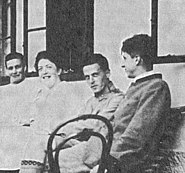Form of life (philosophy)
hideThis article has multiple issues. Please help or discuss these issues on the talk page. (Learn how and when to remove these template messages)
|
| Part of a series on |
| Ludwig Wittgenstein |
|---|
 |
Form of life (German: Lebensform) is a term used sparingly by Ludwig Wittgenstein in posthumously published works Philosophical Investigations, On Certainty and in parts of his Nachlass. The term itself is ambiguously understood, giving grounds for both a universal and/or relativistic understanding of Wittgenstein's philosophy and as such should not be presented here as a either the one or the other.[1]
Description[]
The general opinion or agreement amongst scholars, seem to revolve around how to identify or rather set one lifeform apart from other lifeforms or other ways of living. Roughly meaning a description of how or why for instance a human being is different from other beings or how one culture differs from another.
Here lies also the ambiguity of what properties constitute the form of life, being it historical, biological or cultural which is still being debated. The most agreed upon view seem to be that of the cultural, referring to how a human being normally lives its life within a cultural context. This also defining its form of life within that context, which again relates to a historical and biological understanding of the subject in question.
Philosophical Investigations[]
There is mention of Lebensform or form of life five times throughout the Philosophical Investigations (PI)[2] in paragraphs PI: 19, PI: 23 and PI: 241 as well as in part two PPF: 174 and PPF: 229 (formerly PI II).
Wittgenstein in his Tractatus Logico-Philosophicus (TLP) was concerned with the structure of language, responding to Frege and Russell. Later, Wittgenstein found the need to revise the view held in TLP as he did not resolve issues concerning elementary propositions. Leading up to a revised view in his PI, still concerned with language, but now focusing on how it is used and not insisting that it has an inherent structure or set of rules. Deriving from this that language comes about as a result of human activity.
Use by Agamben[]
Italian philosopher Giorgio Agamben takes up the intersecting concepts of form-of-life, rule-following and use, but besides attempting to deconstruct what Wittgenstein meant, traces these concepts genealogically, in the manner of Stirner or Rousseau. In The Highest Poverty – Monastic Rules and Form-of-Life, Agamben looks at the emerging genre of written rules starting in the 9th century, and its development into both law and something beyond law in the Franciscan form-of-life, in which the Franciscans replaced the idea that we possess our life (or objects generally) with the concept of 'usus', that is 'use'. Agamben finds earlier versions of form-of-life in monastic rules, developing from 'vita vel regula', 'regula et vita', 'forma vivendi', and 'forma vitae'. Thus Agamben takes Wittgenstein's concepts and applies them to the history of Western monasticism in order to rethink the consequences of these concepts for doing (contemporary) politics — the main goal of his Homo Sacer-project, which started with Homo Sacer: Sovereign Power and Bare Life and to which The Highest Poverty belongs.
See also[]
- Realia (translation)
- Language game (philosophy)
References[]
- ^ Biletzki, Anat; Matar, Anat (2020), "Ludwig Wittgenstein", in Zalta, Edward N. (ed.), The Stanford Encyclopedia of Philosophy (Spring 2020 ed.), Metaphysics Research Lab, Stanford University, retrieved 2020-12-13
- ^ Wittgenstein, Ludwig, 1889-1951. (2009). Philosophische Untersuchungen = Philosophical investigations. Anscombe, G. E. M. (Gertrude Elizabeth Margaret), Hacker, P. M. S. (Peter Michael Stephan), Schulte, Joachim. (Rev. 4th ed.). Chichester, West Sussex, U.K.: Wiley-Blackwell. ISBN 978-1-4051-5928-9. OCLC 368019558.CS1 maint: multiple names: authors list (link)
Bibliography[]
- Giorgio Agamben. The Highest Poverty: Monastic Rules and Form-of-Life. Translated by Adam Kotsko. Stanford University Press 2013.
- Rahel Jaeggi, Critique of Forms of Life. Cambridge, Mass. / London 2019
- David Kishik, Wittgenstein's Form of Life. London: Continuum, 2008. ISBN 9781847062239
- Jesús Padilla Gálvez; Margit Gaffal, Forms of Life and Language Games. Heusenstamm, Ontos Verlag, 2011. ISBN 9783868381221 [1]
- Jesús Padilla Gálvez, Margit Gaffal (Eds.): Doubtful Certainties. Language-Games, Forms of Life, Relativism. Ontos Verlag, Frankfurt a. M., Paris, Lancaster, New Brunswick 2012, ISBN 9783868381719.
- Ludwig Wittgenstein. Philosophical Investigations: The German Text, with a Revised English Translation 50th Anniversary Commemorative Edition. Trns, G.E.M. Anscombe. Wiley-Blackwell; 3rd edition, 202. ISBN 9780631231271
External links[]
- "Remarks on Frazer's Golden Bough", a Synopsis by Robert Wesley Angelo
- Philosophy of science
- Continental philosophy
- Ludwig Wittgenstein